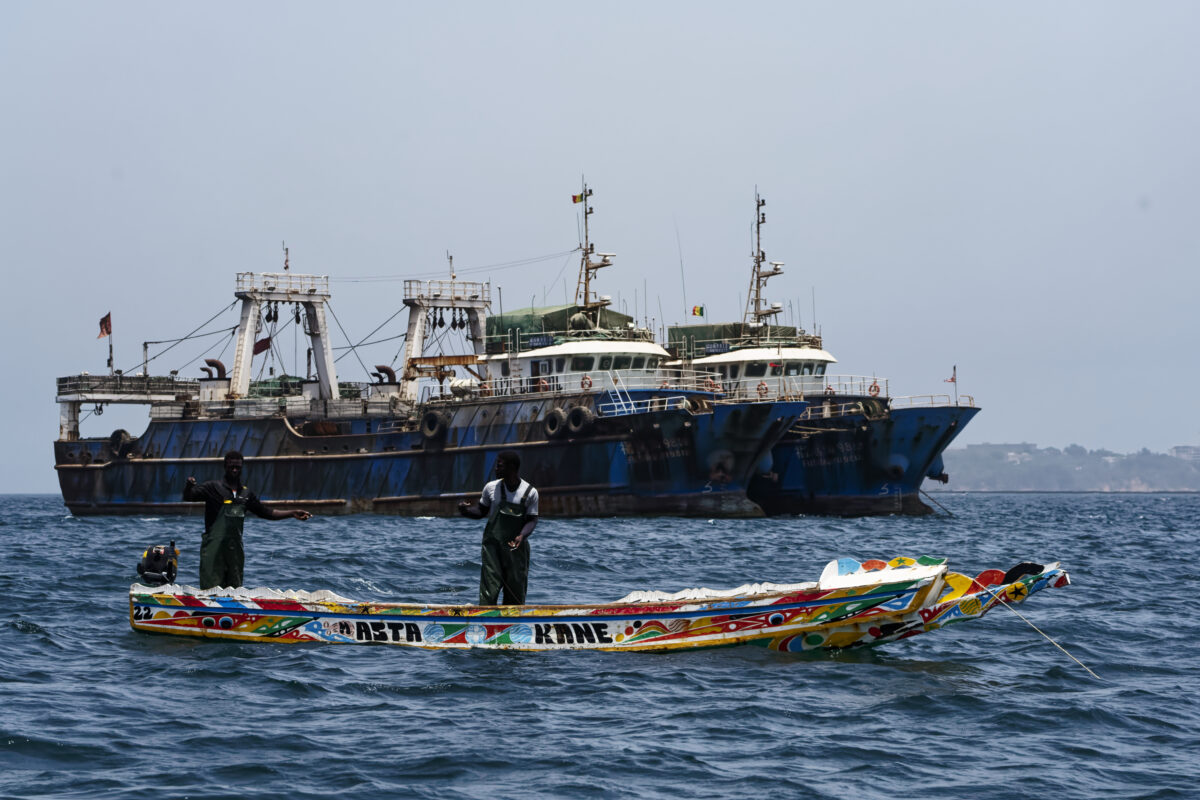Blue Ventures, a marine conservation organization working to rebuild coastal fisheries and restore ocean life, has launched a three-year project (2024-2027) in West Africa to support the livelihoods and food security of coastal communities against the threats of industrial overfishing.
The region’s small-scale fisheries are increasingly threatened by overfishing by distant-water fleets, whose destructive fishing practices cause devastating, permanent damage to sensitive marine ecosystems and undermine critically important coastal fisheries. Moreover, instead of feeding local communities, much of the catch of the industrial fleet is exported to high-income countries, often without ever making landfall or entering local coastal economies. A large and growing proportion of this catch is transformed into fishmeal and oil to feed high-value fish in foreign aquaculture farms, diverting catches away from local value chains, undermining livelihoods – especially of women – and food security. Added to this, illegal, unregulated and unreported (IUU) fishing continues to grow, with estimates suggesting that these cost west African economies at least $2.31 billion in annual losses.
The overfishing crisis in west Africa requires holistic and regional solutions. Industrial bottom trawling, pelagic trawling and purse seining all contribute to the overfishing in the region. Effective protection of small-scale fisheries will require not just increased surveillance, but also greater transparency and better fisheries governance by national and regional governments.
The program is led by grassroots national and local organizations working directly with coastal and artisanal fishing communities. It aims to create a regional advocacy network to challenge industrial overfishing and bolster grassroots civil society engagement. The grand kick-off took place at PRCM’s 11th edition of the Regional Coastal and Marine Forum held from 22 to 26 April in the Republic of Guinea Bissau, the largest assembly of marine and coastal conservation stakeholders in west Africa.
Over the next few months and years of the project – that in its first phase includes Senegal, Gambia, Cabo Verde and Cameroon – Blue Ventures hopes to develop tools and information materials to support advocacy efforts, launch national/regional campaigns for better policy development and enforcement against industrial fishing, and ensure sustainable fisheries management through ongoing, coordinated surveillance.
Aissata Dia, Blue Ventures’ advocacy lead in the region, expressed the urgency of this cause: “The activities of industrial vessels are depriving small-scale fishers of their livelihoods and affecting food security in the region. Blue Ventures believes in the power of small-scale fishers to transform coastal conservation, and we place them at the heart of everything we do.”
Collaboration is critical to this initiative. Blue Ventures is partnering with national and local organizations, scientific institutions, NGOs, private sector stakeholders, and technical and financial partners to secure the future of the region’s coastal communities and marine ecosystems.
Ms Aby Diouf, a member of the National Coalition for Sustainable Fishing (CONAPED), expressed her support for the organization’s work in the region, stating: “Thanks to the financial support of Blue Ventures, CONAPED was able to meet the candidates in the Senegalese presidential election, including the current government, to encourage them to sign the charter for sustainable fishing. These commitments contributed to the decision to publish the list of industrial fishing vessels authorized to fish in Senegal, which is a major step towards greater transparency in the management of the fisheries sector.”
The inclusion of a diversity of actors in the program offers open and better-informed dialogue among fisheries stakeholders, which in turn provides an opportunity to engage meaningfully in decision-making processes. Blue Ventures hopes this new initiative will significantly and positively impact west Africa’s coastal communities and lead to a brighter, more sustainable future. In the short-run, the organization hopes to encourage the region’s governments to take urgent steps to make transparency in fisheries a reality, by regularly publishing the lists of fishing vessels, joining the Fisheries Transparency Initiative (FiTI) – a global initiative promoting transparency and public disclosure of information on fisheries governance, – and/or by adopting transparency principles of the Global Charter for Fisheries Transparency (addressing lack of transparency in three critical areas: vessel information, fishing activity, and governance and management) into law and practice.




